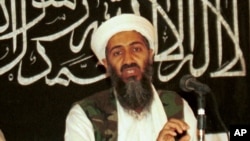Right up until the end, al-Qaida founder Osama bin Laden remained focused on striking the United States, its Western allies and governments seen as U.S. proxies, and he was leery of distractions that could weaken the terror group's resolve.
“America was never as hated and detested by all the people in the world as it is now,” bin Laden wrote in a letter, citing “the torture of the brothers in Guantanamo and Abu Ghraib.”
“Everyone should forget about his disagreements and focus his efforts on eliminating the bigger adversary,” he said in a separate, undated letter to a Shaikh Mahmud.
50 documents released
The letters, among almost 50 declassified documents released Thursday by the U.S. intelligence community, shed few new insights into bin Laden's thinking as he hid in his compound in Abbottabad, Pakistan.
Rather, the last of three installments of material captured during the 2011 raid that killed the terror mastermind helps complete a picture of al-Qaida at a critical juncture, as it tried to spread its influence during the early days of the so-called Arab Spring.
“The declassified documents reveal bin Laden's strategy for upending global politics through protracted violent conflict,” according to one of the analysts who worked on the documents.
Hoping for U.S. involvement
According to the documents, bin Laden saw the Arab Spring as a “transitional phase” and wrote of the need to “portray our vision on the revolutions in the Arab world.”
But the focus was still on pushing Arab regimes with good ties to the West toward a tipping point, hoping the U.S. would intervene and create an opening for the jihadist movement.
“What you're seeing then is the early parts of its strategy that then got this unexpected lift,” said Daveed Gartenstein-Ross, a senior fellow at the Foundation for Defense of Democracies. “They're looking at how to disperse fighters and cause chaos and suddenly the whole region is plunged into chaos.”
“Jihadists could actually get a sizeable foothold without the U.S. stepping in,” he said, allowing al-Qaida to change its trajectory following bin Laden's death into an even more dangerous threat.
“It can operate much more openly now,” said Gartenstein-Ross. “It has much more of a presence across multiple theaters.”
Sons warned in letters
While bin Laden may not have been able to envision the threat his terror group eventually would pose, other documents show he was keenly aware of his security environment.
Throughout, he remained deeply suspicious of Iran, referring to what he called “tyrant prisons,” while noting how Tehran was hosting members of his family.
In a letter to his sons Uthman and Muhammad, bin Laden warned of the lengths to which Iran might go to track their movements.
“Remember any questionable action or observation in any hospital in Iran,” he wrote. “If they inject you with a shot, this shot might be loaded with a tiny chip.”
It was not the first time the al-Qaida leader had worried about efforts to track family members after visits to Iran.
Worried about tracking devices
In a letter released last year as part of the second tranche of declassified materials, bin Laden worried that tracking devices may have been implanted in a filling his wife got while visiting a dentist in Iran, although he blamed the U.S.
“The size of the chip is about the length of a grain of wheat and the width of a fine piece of vermicelli,” he wrote.
Yet at other times, as revealed in this last set of documents, the al-Qaida leader's paranoia appears to give way to optimism, pointing to U.S. failures in Iraq and Afghanistan.
In a letter to his sister Um Abd-al-Rahman, bin Laden even expresses hope that he will be able to see her soon.
“The media released the speech of President Obama that he would withdraw the American forces from Afghanistan after six months,” he wrote. “Matters will be relieved and our movement will be easier.”
Still other documents reveal deliberations on matters both mundane and, perhaps, surprising.
Image, branding a concern
In one letter to Abu Muhammad Salah, bin Laden addresses what he calls “the top secret matter” of al-Qaida militants “in their unfortunate celibacy” due to a lack of available wives.
“We have no objection to clarifying to the brothers that they may, in such conditions, masturbate,” he wrote.
Still other discussions touched on the use of hostages, the forging relationships with selected media outlets and persistent concerns about al-Qaida's image and branding.
“It continues to show how connected bin Laden was to the overall al-Qaida network even though his Internet access was limited,” said Gartenstein-Ross. “He knew that he could direct strategy and would be listened to.”
VOA's Lynn Davis contributed to this report




